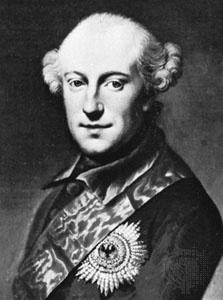Ferdinand
Prussian general
born Jan. 12, 1721, Wolfenbüttel, Brunswick-Lüneburg-Wolfenbüttel 【Germany】
died July 3, 1792, Vechelde, Brunswick
 duke of Brunswick-Lüneburg and Prussian general field marshal who defended western Germany for his brother-in-law Frederick II the Great in the Seven Years' War (1756–63), protecting the Prussian flank from French attack, while Frederick fought the Austrians.
duke of Brunswick-Lüneburg and Prussian general field marshal who defended western Germany for his brother-in-law Frederick II the Great in the Seven Years' War (1756–63), protecting the Prussian flank from French attack, while Frederick fought the Austrians.Entering the Prussian army in 1740, Ferdinand participated in the victorious engagements of Mollwitz (1741), Chotusitz (1742), and Sohr (1745) during the Silesian Wars against Austria. In the Seven Years' War, he campaigned with Frederick in Saxony and Bohemia until given an independent command as head of the allied (Prussian and English) armies in western Germany (1757). There, though nearly always outnumbered, he defeated the French at Krefeld (1758) and Minden (1759).
Ferdinand became estranged from Frederick in 1766 and retired from the Prussian service, accepting a field marshal's rank in the Austrian army that same year but never actively serving the Habsburgs. At the outbreak of war between England and its North American colonies, Ferdinand was offered the post of commander in chief by the English, but he declined the appointment. After his retirement, relations with Frederick improved once again, and Ferdinand visited the Prussian king several times between 1772 and 1782.
king of Bulgaria
in full Ferdinand Karl Leopold Maria
born Feb. 26, 1861, Vienna, Austria
died Sept. 10, 1948, Coburg, Ger.
prince (1887–1908) and first king (1908–18) of modern Bulgaria.
The youngest son of Prince Augustus (August) I of Saxe-Coburg-Gotha, Ferdinand was elected prince of Bulgaria on July 7, 1887, as successor to the first ruler of that autonomous principality, Alexander I, who was forced by a pro-Russian coup d'état to abdicate the preceding year. Though dominated by his prime minister, Stefan Stambolov, during the early years of his reign, he became an important factor influencing national affairs after his minister's humiliating fall from power (1894). Ferdinand's dynastic position, which long suffered from lack of recognition by the Great Powers, was strengthened by his marriage to the Bourbon princess Maria Luisa of Parma (April 1893) and later by his infant son Boris's reception into the Orthodox church (February 1896). The assurance of an Orthodox successor to the Bulgarian throne, as well as the skillful performance of Konstantin Stoilov's government in maintaining national independence, eventually prompted Russia to seek a diplomatic rapprochement. In March 1896 Ferdinand finally received international confirmation of his rule.
After Stoilov's resignation in 1899, Ferdinand maintained a tight hold on Bulgarian domestic politics. On Oct. 5, 1908, he used the occasion of the eve of the Austro-Hungarian annexation of Bosnia-Hercegovina to proclaim the full independence of Bulgaria from the Ottoman Empire and assumed the title of king, or tsar. Possessed of imperialistic ambition, he spearheaded the formation of the Balkan League (1912), consisting of Bulgaria, Serbia, Greece, and Montenegro (associated informally), that pursued the partitioning of European Turkey (First Balkan War (Balkan Wars), October 1912–May 1913), a move prodded by Russia. Ferdinand's territorial ambitions proved doomed when the victorious allies failed to agree on the disposition of captured Turkish territory, and Serbia and Greece formed an alliance against Bulgaria. Joined by the Turks and Romanians, the alliance defeated the Bulgarians (Second Balkan War, June–July 1913). Ferdinand's resentments largely determined Bulgaria's participation (1915–18) in World War I on the side of Germany and Austria-Hungary. Following Bulgaria's military defeat in 1918, he was obliged to abdicate in favour of his son Boris III (Oct. 4, 1918). Thereafter he lived in Coburg.
- Sherman, John
- Sherman Minton
- Sherman, Roger
- Sherman tank
- Sherman, William Tecumseh
- Sherpa
- Sherrie Levine
- Sherriff, R.C.
- Sherrington, Sir Charles Scott
- sherry
- 's-Hertogenbosch
- Sherwood Anderson
- Sherwood Forest
- Sherwood, Robert E.
- Sheshonk I
- Shetland Islands
- Shetland pony
- Shetland sheepdog
- Shevardnadze, Eduard
- Shevchenko, Taras Hryhorovych
- Shewa
- shewbread
- Shexian
- Sheyenne River
- shi